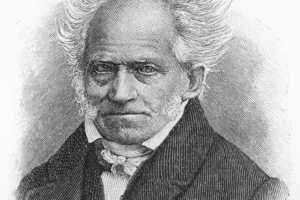Arthur Schopenhauer, A Brilliant Philosopher

Arthur Schopenhauer was one of the most brilliant philosophers of the nineteenth century. He was a great thinker as well as possessing a unique sense of humor.
Many consider him to be the greatest representative of philosophical pessimism. Others think of him as a realistic and outspoken thinker who uncovered the least presentable aspects of reality and existence. Indeed, he did declare that life simply wasn’t worth it. However, he announced this with the utmost grace.
We think of Arthur Schopenhauer as heir to the philosophy of Kant and Spinoza. However, this amazing philosopher was also interested in Eastern ways of thinking such as Buddhism, Taoism, and Vedanta. From his ideas, emerged universal approaches that remain valid today.
“The doctor sees all the weakness of mankind, the lawyer all the wickedness, the theologian all the stupidity.”
-Arthur Schopenhauer-
His childhood
Arthur Schopenhauer was born in Danzig (Poland) on February 22, 1788. His father, Heinrich Floris Schopenhauer, was a prosperous merchant. He initiated his son into the business world. His mother, Johanna Henriette Trosenier, was a sociable and outgoing woman who became a writer.
It was Johanna who organized literary evenings in their house. The most illustrious intellectuals of the time attended, including Goethe. Arthur was around for these meetings, but his sullen and withdrawn personality prevented him from enjoying them. For this reason, he had rather a difficult relationship with his mother.
When Arthur was five, the family moved to Hamburg. He began his private education there. The aim was for him to become his father’s successor in business. Needless to say, this never happened. Arthur had a sister who was nine years his junior. However, he didn’t have a close relationship with her.
A new thinker
Arthur’s father wanted him to become a merchant. In 1805, at the age of 17, he began his training. However, in the same year, his father died. Apparently, he committed suicide. The family moved to Weimar, but Arthur remained in Hamburg. In 1809, he decided to leave the trade and enrolled in medicine at the University of Göttingen.
While at university, Schopenhauer discovered several philosophers. In fact, he became passionate about reading them. In this way, he discovered his true vocation. He moved to Berlin in 1811 and began several courses in philosophy. He also studied philology, history, and natural sciences. Finally, he obtained a doctorate in philosophy at the University of Jena in 1813.
He then returned to his maternal home in Weimar. There, he had the chance to enter into long conversations with Goethe. He’d admired this philosopher throughout his life. He also admired Shakespeare, Homer, and the writers of the Spanish Golden Age. In fact, he translated some of these works into German. Later, he moved to Dresden. It was there that he wrote his esteemed book The World as Will and Representation. It was published in 1819.
A great thinker
The publication of this book identified Schopenhauer’s unique way of thinking. In fact, it was where his proverbial pessimism took shape. This was based on one premise. That we live in the worst of all possible worlds. He was beginning to be viewed as a skeptical thinker. Indeed, he denounced human irrationality at a time when the myth of reason prevailed.
However, Schopenhauer’s thinking didn’t become cynical. Instead, he advocated a new ethic of compassion toward “all that has life”. He defined art as the ultimate balm to soothe all the sorrows and futility of existence. Later, he became famous worldwide for his aphorisms in which he stated that joy and pessimism aren’t mutually exclusive.
Initially, there was no interest in his work. In fact, it was destroyed due to a lack of buyers. However, over the years he became one of the best-known thinkers. Even Richard Wagner sent him an autographed copy of his opera, The Ring of the Nibelung to express his admiration.
Schopenhauer was a contradictory thinker. He promoted vegetarianism but ate meat. In addition, he spoke to his dogs in several languages and treated them like humans.
He fell ill with cholera and moved to Frankfurt, where he lived for more than two decades. In 1836, he published On the Will in Nature. He died in September 1860.
‘The safest way of not being very miserable is not to expect to be very happy.’
-Arthur Schopenhauer-
Arthur Schopenhauer was one of the most brilliant philosophers of the nineteenth century. He was a great thinker as well as possessing a unique sense of humor.
Many consider him to be the greatest representative of philosophical pessimism. Others think of him as a realistic and outspoken thinker who uncovered the least presentable aspects of reality and existence. Indeed, he did declare that life simply wasn’t worth it. However, he announced this with the utmost grace.
We think of Arthur Schopenhauer as heir to the philosophy of Kant and Spinoza. However, this amazing philosopher was also interested in Eastern ways of thinking such as Buddhism, Taoism, and Vedanta. From his ideas, emerged universal approaches that remain valid today.
“The doctor sees all the weakness of mankind, the lawyer all the wickedness, the theologian all the stupidity.”
-Arthur Schopenhauer-
His childhood
Arthur Schopenhauer was born in Danzig (Poland) on February 22, 1788. His father, Heinrich Floris Schopenhauer, was a prosperous merchant. He initiated his son into the business world. His mother, Johanna Henriette Trosenier, was a sociable and outgoing woman who became a writer.
It was Johanna who organized literary evenings in their house. The most illustrious intellectuals of the time attended, including Goethe. Arthur was around for these meetings, but his sullen and withdrawn personality prevented him from enjoying them. For this reason, he had rather a difficult relationship with his mother.
When Arthur was five, the family moved to Hamburg. He began his private education there. The aim was for him to become his father’s successor in business. Needless to say, this never happened. Arthur had a sister who was nine years his junior. However, he didn’t have a close relationship with her.
A new thinker
Arthur’s father wanted him to become a merchant. In 1805, at the age of 17, he began his training. However, in the same year, his father died. Apparently, he committed suicide. The family moved to Weimar, but Arthur remained in Hamburg. In 1809, he decided to leave the trade and enrolled in medicine at the University of Göttingen.
While at university, Schopenhauer discovered several philosophers. In fact, he became passionate about reading them. In this way, he discovered his true vocation. He moved to Berlin in 1811 and began several courses in philosophy. He also studied philology, history, and natural sciences. Finally, he obtained a doctorate in philosophy at the University of Jena in 1813.
He then returned to his maternal home in Weimar. There, he had the chance to enter into long conversations with Goethe. He’d admired this philosopher throughout his life. He also admired Shakespeare, Homer, and the writers of the Spanish Golden Age. In fact, he translated some of these works into German. Later, he moved to Dresden. It was there that he wrote his esteemed book The World as Will and Representation. It was published in 1819.
A great thinker
The publication of this book identified Schopenhauer’s unique way of thinking. In fact, it was where his proverbial pessimism took shape. This was based on one premise. That we live in the worst of all possible worlds. He was beginning to be viewed as a skeptical thinker. Indeed, he denounced human irrationality at a time when the myth of reason prevailed.
However, Schopenhauer’s thinking didn’t become cynical. Instead, he advocated a new ethic of compassion toward “all that has life”. He defined art as the ultimate balm to soothe all the sorrows and futility of existence. Later, he became famous worldwide for his aphorisms in which he stated that joy and pessimism aren’t mutually exclusive.
Initially, there was no interest in his work. In fact, it was destroyed due to a lack of buyers. However, over the years he became one of the best-known thinkers. Even Richard Wagner sent him an autographed copy of his opera, The Ring of the Nibelung to express his admiration.
Schopenhauer was a contradictory thinker. He promoted vegetarianism but ate meat. In addition, he spoke to his dogs in several languages and treated them like humans.
He fell ill with cholera and moved to Frankfurt, where he lived for more than two decades. In 1836, he published On the Will in Nature. He died in September 1860.
‘The safest way of not being very miserable is not to expect to be very happy.’
-Arthur Schopenhauer-
All cited sources were thoroughly reviewed by our team to ensure their quality, reliability, currency, and validity. The bibliography of this article was considered reliable and of academic or scientific accuracy.
Von Gwinner, W. (2020). Arthur Schopenhauer: Presentado desde el trato personal (Vol. 46). Hermida Editores.
This text is provided for informational purposes only and does not replace consultation with a professional. If in doubt, consult your specialist.








